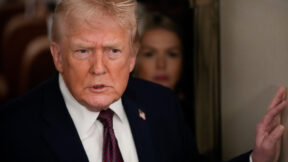Ex-Twitter Executive and Family Live in ‘Hiding’ With ‘Armed Guards’ After Attacks From Trump, Elon Musk

Michel Euler/AP
Yoel Roth, former head of trust and safety at Twitter, wrote a guest essay for the New York Times that was published Monday and offered a stark warning as to the future of social media as guardrails are taken down.
Roth initially stayed on at Twitter after Elon Musk took over, but eventually left the company as Musk gutted his division and stirred controversy with both his personal behavior and leadership of the company.
In the Times, Roth laid out how as a result of his time at Twitter he had become the target of a campaign of harassment, promoted by both Donald Trump and Musk:
Backed by fans on social media, Mr. Trump publicly attacked me. Two years later, following his acquisition of Twitter and after I resigned my role as the company’s head of trust and safety, Elon Musk added fuel to the fire. I’ve lived with armed guards outside my home and have had to upend my family, go into hiding for months and repeatedly move.
This isn’t a story I relish revisiting. But I’ve learned that what happened to me wasn’t an accident. It wasn’t just personal vindictiveness or “cancel culture.” It was a strategy — one that affects not just targeted individuals like me, but all of us, as it is rapidly changing what we see online.
Roth recalled how he led the team that first added a fact check to a Trump tweet and the resulting attention and harassment he received after a Trump official made him a public figure. “On May 27, the morning after the label went up, the White House senior adviser Kellyanne Conway publicly identified me as the head of Twitter’s site integrity team. The next day, The New York Post put several of my tweets making fun of Mr. Trump and other Republicans on its cover,” Roth wrote of the incident.
“Legions of Twitter users, most of whom days prior had no idea who I was or what my job entailed, began a campaign of online harassment that lasted months, calling for me to be fired, jailed or killed,” he added. Fast forward a few years later “Mr. Musk went further by taking a paragraph of my Ph.D. dissertation out of context to baselessly claim that I condoned pedophilia — a conspiracy trope commonly used by far-right extremists and QAnon adherents to smear L.G.B.T.Q. people,” Roth wrote, adding:
The response was even more extreme than I experienced after Mr. Trump’s tweet about me. “You need to swing from an old oak tree for the treason you have committed. Live in fear every day,” said one of thousands of threatening tweets and emails.
Roth’s lengthy essay recalls the threats and harassment against him as a way of shoring up his claim that social media is becoming untethered to both moral leadership and regulation. The central premise of his argument is that Twitter, and other platforms, are under attack from forces that wish to weaponize them to spew hate and division while recruiting for authoritarian causes.
“Tech platforms are retreating from their efforts to protect election security and slow the spread of online disinformation. Amid a broader climate of belt-tightening, companies have pulled back especially hard on their trust and safety efforts,” Roth noted, arguing that the pressure placed on trust and safety teams not to do their jobs is both as much by design by bad actors as it is due to economic factors.
Read the full essay here.
New: The Mediaite One-Sheet "Newsletter of Newsletters"
Your daily summary and analysis of what the many, many media newsletters are saying and reporting. Subscribe now!






Comments
↓ Scroll down for comments ↓